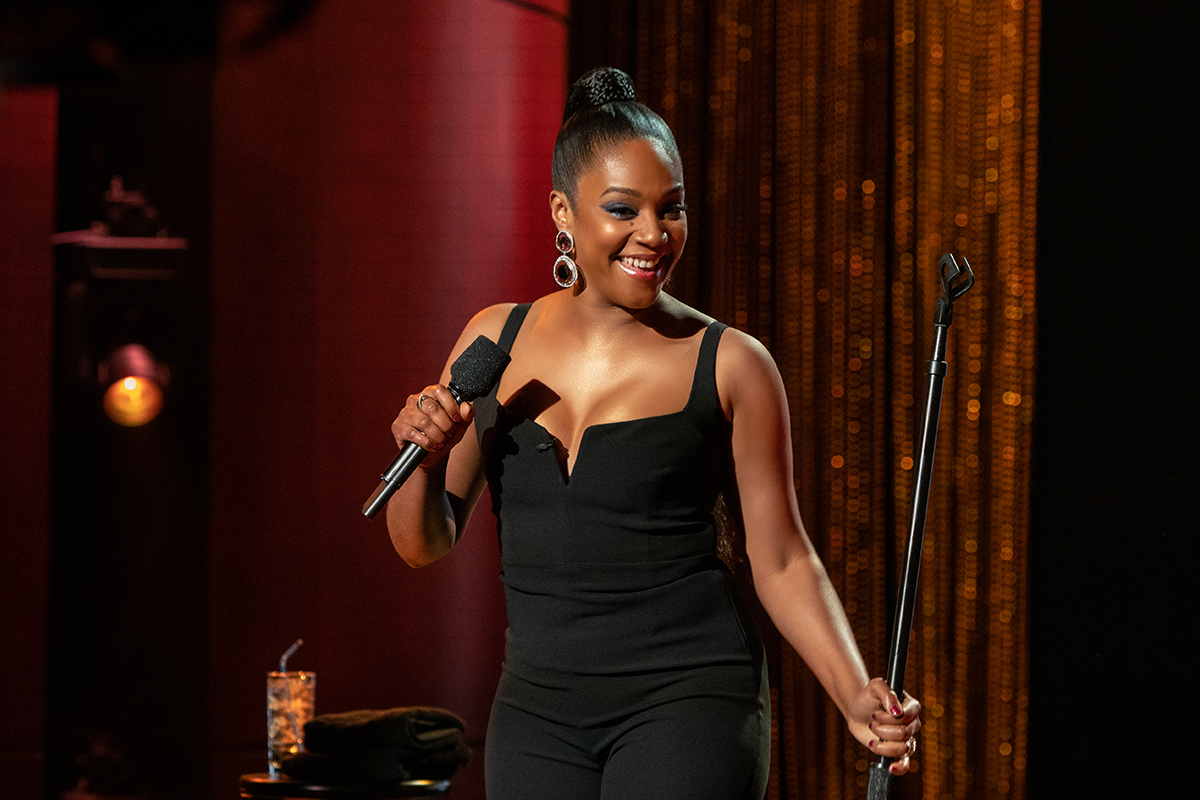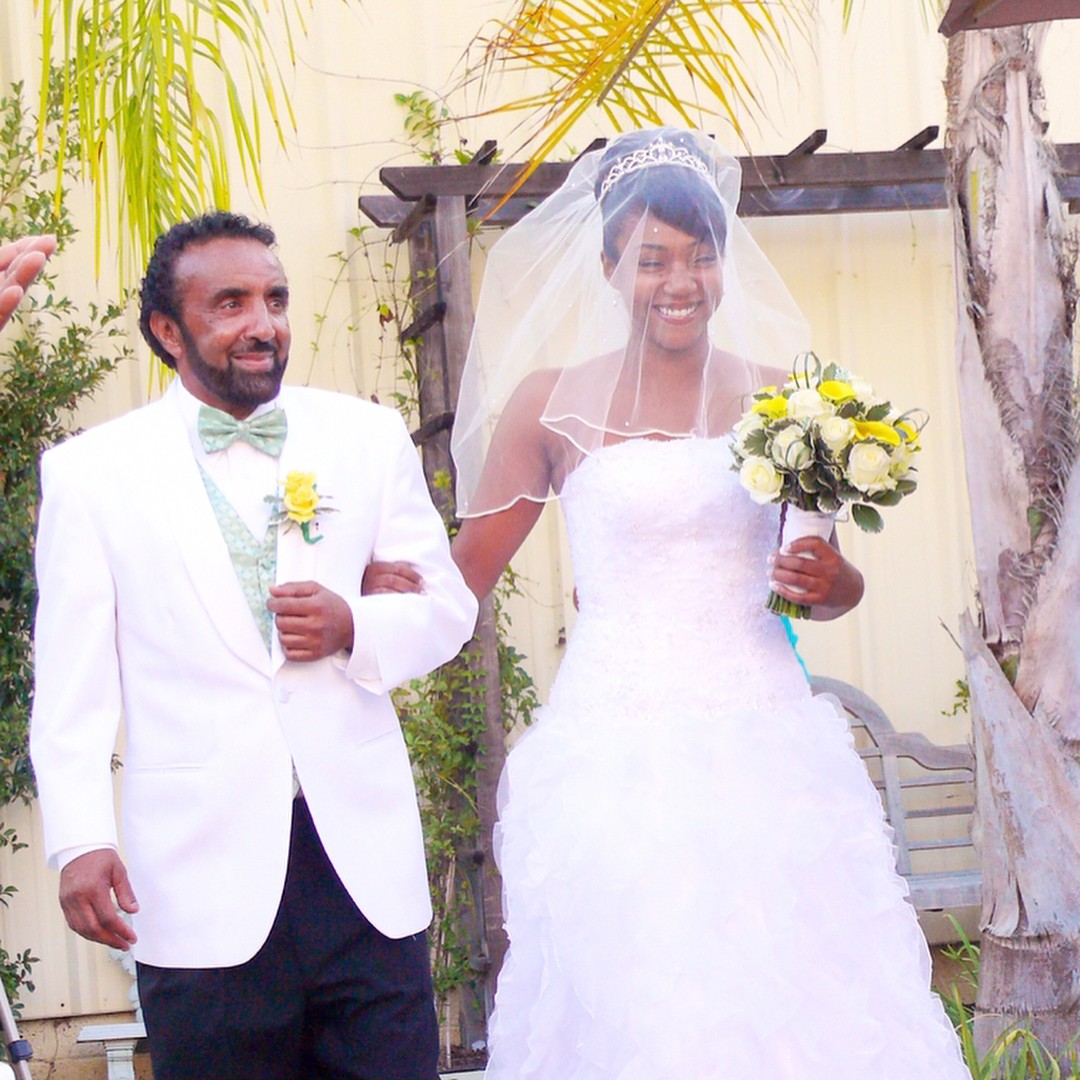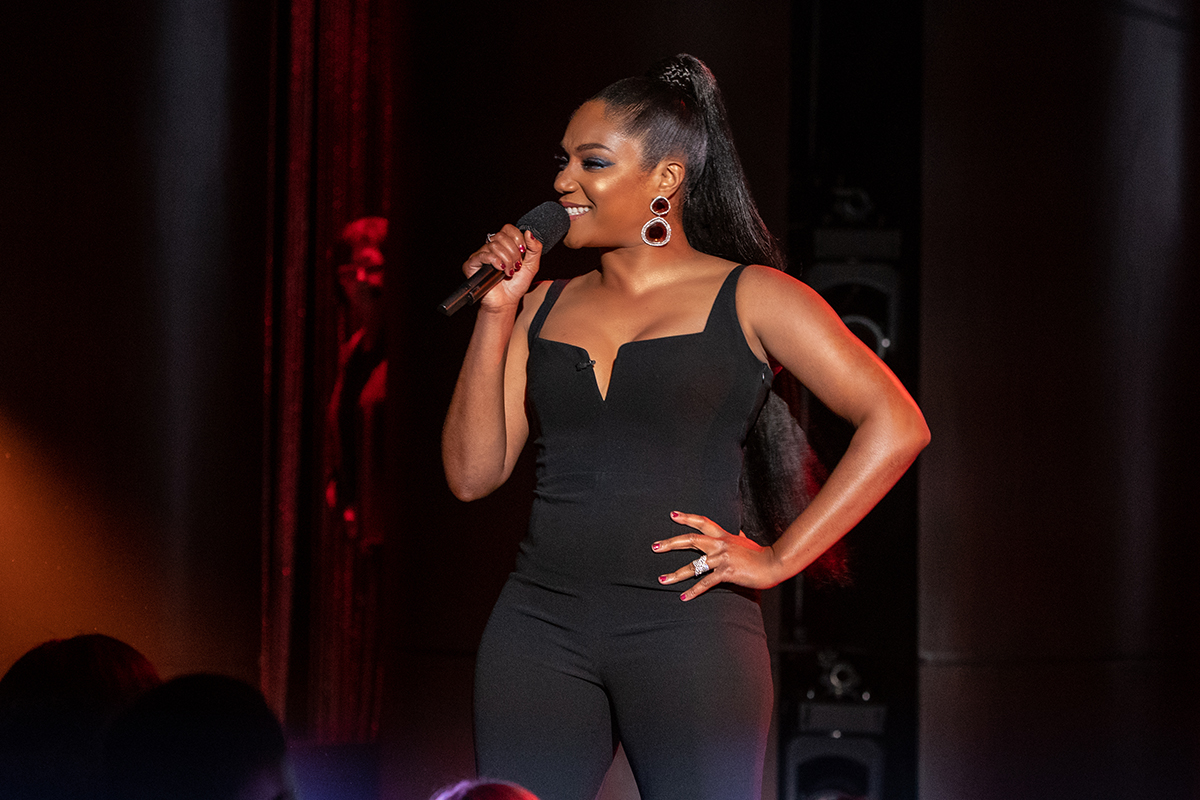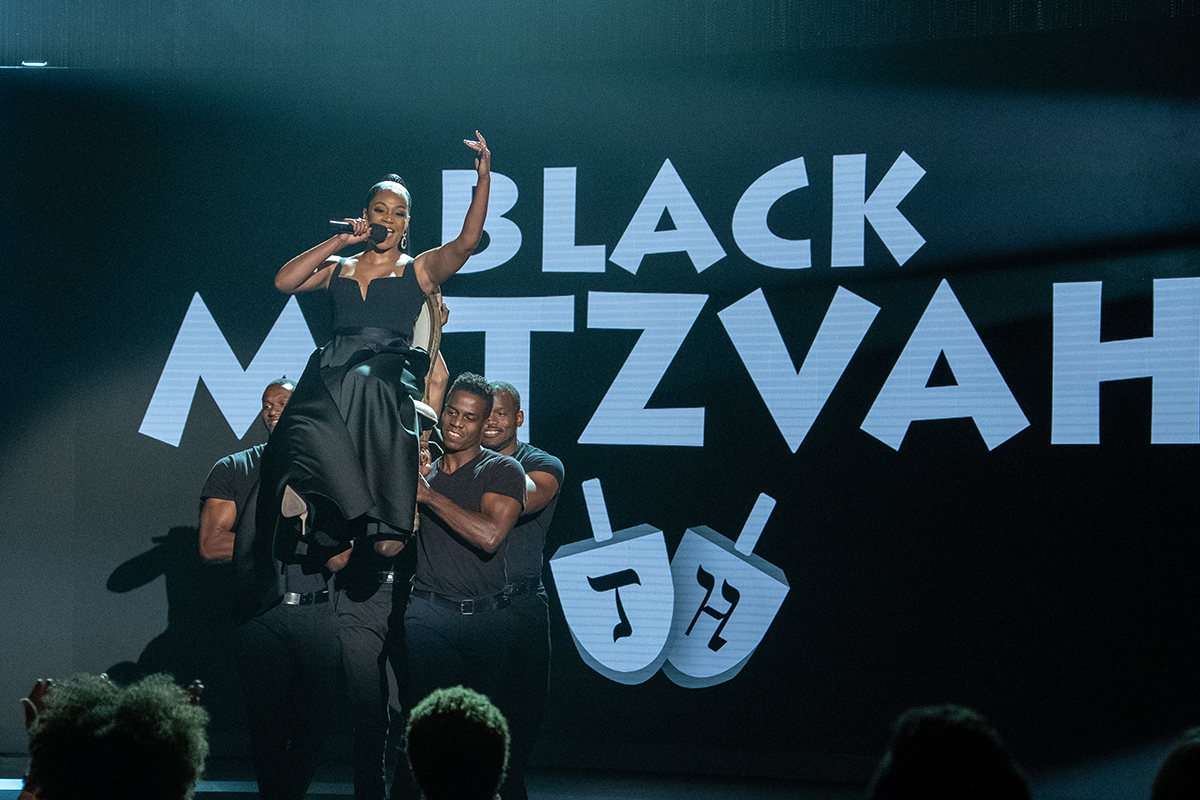Like me, Tiffany Haddish will be celebrating her bat mitzvah in December, but that is where the similarities between our coming-of-age ceremonies end. Mine was on the eve of my 13th birthday, in the suburbs of New York City, and Tiffany’s will be a red carpet event on her 40th birthday, the day her Netflix special Black Mitzvah is released.
“For a long time, I didn’t even know Black Jews existed. I didn’t know anything about Judaism for a long time,” Tiffany Haddish tells me in the middle of our conversation. We were discussing what people’s reaction to her opening up about her Jewish identity have been — on Alma, the reaction to her announcement of Black Mitzvah and her plans for a bat mitzvah were met with sheer joy.

Black Mitzvah, her special that will be released on December 3, is basically one long d’var Torah, telling the audience that she is there to teach. She talks about what she’s learned in her life — from her histories with men, to her experiences in foster care, to when she bombed a stand-up show on New Year’s Eve because she was extremely hungover. She even talks about her history with other religions — her mother was a Jehovah’s Witness (they have the best butterscotch candies), she had a brief stint with Scientology (she quickly left because she hates bunk beds), and Catholicism didn’t quite do it for her (the wafers are not seasoned, the “wine” is just grape juice).
And, of course, she talks about Judaism.
Unless you were expecting anything less from a special called Black Mitzvah, it opens with Haddish being carried on stage in a chair by four men while she sings “Hava Nagila.”
“That’s one of my favorite songs, one of my favorite songs sung in Hebrew,” Haddish tells me. “It’s that song, and the other song [sings li li li li li li].” Yes, Tiffany Haddish, for a moment, sounds like a cantor while singing the classic Havdalah melody to me.
But back to “Hava Nagila.”
“The reason I love that song is because what it’s saying, is let’s celebrate, to life, let’s party, my brothers, let’s come together, let’s enjoy life. This is the life we have to live, so let’s celebrate it together. That is so powerful, and I feel like that’s what I was doing; I was celebrating the life I have to live. I was celebrating with the people that were in the audience, and the people that were going to be watching. And, it might not be perfect — life isn’t perfect, I’m not perfect. But we should celebrate the opportunities that we have to live. That’s why I wanted to open with that: It’s a mitzvah, a celebration, we’re alive.”
While Haddish wasn’t always so familiar with Jewish liturgy, she’s no stranger to the bar/bat mitzvah celebration. She was first introduced to the Jewish community in 1996, when at age 17 she began working as an “energy producer” (i.e. dancer and MC) on the b’nei mitzvah circuit. She held onto that job until 2009; by her count, she’s worked over 500 of them. (At one, she may have accidentally killed a man.)
“I didn’t know anything about Judaism for a long time,” she explains. “As I got into that profession as an energy producer, I started learning more and more about the Torah. I could really relate to it. And when I met my father, it really resonated with me. I was like: This is what I am. I did my 23&Me, and it said the same thing. I [thought], well, I can’t deny this. I wanna claim it.”
Haddish met her dad, an Eritrean Jew, for the first time when she was 27 years old. He told her about his Judaism and what it was like to live in Eritrea, where it was illegal to be Jewish. (Eritrea does not officially recognize Judaism as a religion.) He attended her wedding, and although they had a turbulent relationship — as she writes about in her memoir, The Last Black Unicorn — ultimately she found herself through learning about her heritage and history. After her father passed away in 2017, Haddish traveled to Eritrea for the first time. In 2019, she became an Eritrean citizen.

Now, as the day of her bat mitzvah approaches, Haddish recalls her fondest memories of working bat mitzvah parties: the father-daughter dance.
“I wish my father was still alive, so I could dance with him. I mean, I danced with him at my wedding. But that was… I guess that’s enough. I’m looking forward to getting lifted in the chair; I’m excited about that. That’s my favorite part.”
At her bat mitzvah party, she will have a grand entrance, there will be a candle lighting ceremony, a montage, and “lots and lots of dancing.” Her old colleagues — all the people she used to work with at bar and bat mitzvahs — will be in attendance, along with celebrities like Sarah Silverman (Haddish’s favorite Jewish celebrity), Billy Crystal, and Sinbad. “We’re all gonna break it down like the good old days. We’re a lot older so I don’t know how good we’re going to do, but we’re definitely going to be breaking it down.”
Her mother will also be there, which is no small feat. After surviving a near-fatal car accident when Haddish was 8 years old, she was subsequently diagnosed with a mental illness and put in an institution.
“I got her out of that mental institution, that’s one of my proudest accomplishments: Getting her out the mental institution, buying a house for her, getting her the proper care that she needs, and seeing her slowly transform back into my mother that I remember,” Haddish says. Her mom’s institutionalization sent Haddish and her siblings into foster care, eventually ending up with their grandmother. When she turned 18, her grandma kicked her out, and Haddish was homeless. (Again: go read The Last Black Unicorn.)
No stranger to challenges, I asked Haddish what the hardest part of preparing for her bat mitzvah service was.
“Learning to read Hebrew,” she replied. “I can say it, but to actually read the Torah. Learning the alphabet, learning shin, sin, gimmel, mem.”
The other hardest part? “The way you sing. First off, I love that I get to sing, that’s the best part, right? I’m so excited. But learning where it goes [sings]— that! My goodness. Oh, my my. Oy vey. But I love it, I love it.”
(Reader: I so wish I could embed the audio of Tiffany Haddish doing the melody you sing when you chant Torah. It took me right back to studying for my own bat mitzvah and listening to the recording of my synagogue’s cantor singing, and trying to imitate where her voice went up and down. Haddish, in those few seconds, sounds a lot better than I ever did.)
“The main thing I hope that I take away from [my bat mitzvah] is that I inspire some of my friends to maybe study the Torah. Inspire my friends to, you know, dig a little more into their background and their history, and build more community and create conversation.”
Haddish hopes that by opening up about her journey to understand her heritage, it will encourage others to do the same.
“Something that I feel like a lot of African Americans have been stripped of is their history. A lot of us don’t know [our] origin. We don’t know what our origin story is, because that was taken from us. And it talks about that in the Torah, I think it’s so powerful,” Haddish explains. “I feel like more people should figure out who they really are. Find out your bloodline, what you are, study that and learn from that. I’ve learned so much; I’ve been studying the Torah, I’ve been learning Hebrew. I’m so excited about the opportunity to open other’s eyes to the Torah and to the Jewish religion.”
Like many Jews of color, Haddish has also experienced her fair share of racism and discrimination in the community.
“Judaism, I love it, but you have to know Hebrew,” Haddish jokes in Black Mitzvah. “I’ve been to like over 500 bar mitzvahs, and I’m tired of people telling me to go to the kitchen. No, motherfucker, I’m supposed to be here!”
While the audience laughs, that line broke my heart. When I asked her about it — if her relationship with the Jewish community has changed at all, if she feels more welcome in Jewish spaces — Haddish responded, “Well, it depends on what synagogue you walk into, honey. It depends on where you show up. It depends on how old the people are. Some of these people, they come from a time when everyone is supposed to be separated from each other. They come from segregation.”
Haddish continued, “I have no problem saying: This is where I’m supposed to be.”

Her confidence should not be surprising: Haddish is a proud Black Jewish woman. She was the first female Black stand-up comic to host Saturday Night Live, and she won an Emmy for her episode. She’s starred in Girls Trip and Keanu. She voiced Tuca in the beloved (and gone-too-soon) animated show Tuca & Bertie. She is a friend of Beyoncé herself. And so yes, while she still has to deal with racism from the Jewish community, she is not one to be quiet about it. Haddish has no problem speaking up for herself, even using Jewish values to defend her point.
“It’s sad, and it’s totally against what the Torah teaches,” she tells me, referring to racism. “The more information I know, the more I’m like, ‘No, no, no, Mrs. Goldberg, let me show you something! Now right here in Genesis it says…’ It’s so funny how some of them don’t even know the Torah! But they’re like, ‘I’m a devout Jew.’ Oh, you are? Did you know what Deuteronomy says? Let me read some of these laws to you real fast…”
“When I came up with the concept for my special,” Haddish goes on, “I was trying to figure out a way to tell my truth, my experiences in life, and also maybe open other people’s eyes to the fact that in African American culture, there is nothing that says, ‘Okay, you’re officially a woman,’ or, ‘You’re officially a man.’ There’s no ceremony. There’s no rite of passage. I remember having this debate with my friends about this. One of my homeboys said, ‘You know, I’ve been to jail like three times, I’m a man.’ Going to jail — I don’t think that makes you a man. Knowing who you are, knowing where you come from, that’s what makes you an adult. And being able to share your story. That’s what I love about Judaism, because it’s all about sharing your stories and questioning and learning from each other.”
We all have a lot to learn from Tiffany Haddish.
Header image courtesy Netflix. Tiffany Haddish’s Netflix special, Black Mitzvah, is out December 3.



